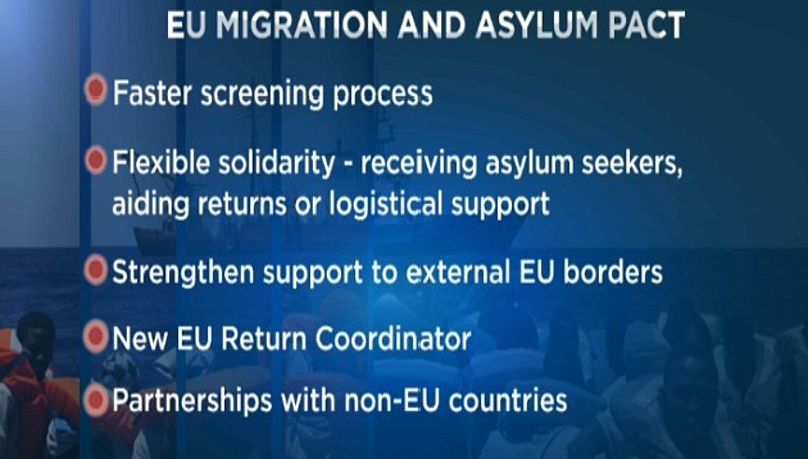The long-overdue migration and asylum policy is set to be unveiled with mandatory measures on how to manage migration.
The European Union has unveiled a long-awaited migration pact, aiming to streamline the asylum process among member states to fix what EU leaders acknowledged was an ineffective system.
 ADVERTISEMENT
ADVERTISEMENT
 ADVERTISEMENT
ADVERTISEMENT
The new pact aims to better share the burden of relocating asylum seekers by allowing member states to contribute by instead returning individuals who do not qualify for asylum or providing logistical support.
EU leaders also hope to create faster border screening processes at the external borders.
Commission President Ursula von der Leyen said that the new pact would strike a "reasonable balance" with all member states sharing the "benefits" and "burdens". She added that it wasn't a question of "whether" EU states should contribute but "how".
Commission Vice President Margarítis Schinás said that the hope would be that this is "a proper single cohesive migration policy".
Migration policy has historically been a thorny issue in EU politics, and it's possible the new migration pact will be a hard sell for the European Commission.
The process has been a delicate balancing act of getting countries who have been averse to mandatory quotas like Poland, Hungary and Austria to accept migrants, and supporting southern countries like Greece, Italy and Malta in dealing with people arriving on their shores from the Mediterranean.
Schinas said that the new pact would put "Dublin to bed" and create a smarter approach, with children and family unifications being the first criteria for relocating migrants.
Speaking to Euronews ahead of the announcement, the Commissioner for Home Affairs, Ylva Johansson vowed there should be "no more Morias", referring to the overcrowded refugee camp on the Greek island of Lesbos which burned down more than a week ago.
"I think it is obvious that Moria is the result, not only, but partly, of the lack of a common European asylum and migration policy," she added.
Johansson said she thought the new policy could bridge differences between member states over migration.
"To be honest I don't think I'll have the chance to have too many 'hoorays' when I present my proposal, but I do think I will have acceptance and respect because I think we are finding the right balance where we show solidarity towards migrants, asylum seekers and between member states, but that we're also clear that those who are not eligible to stay - they have to be returned," Johansson told Euronews.
At a press conference, Schinas added: "Moria is a symptom of a system that is a non-system."
Integrated border strategy
The pact will introduce an integrated border procedure, including pre-entry screening for people crossing the external borders.
The EU Border and Coast Guard Corps will also be deployed from 2021 to provide increased support, a press statement said.
Von der Leyen said that the EU would work with Greek authorities to manage a reception centre in Lesbos for migrant arrivals.
The new screening at borders should take a maximum of five days, EU leaders said. There will also be health checks and a decision about which country will be responsible for the person.
Johansson said the EU needed faster border procedures in order to replace camps such as Moria. She emphasised that two-thirds of people who arrive have a negative asylum decision and that EU leaders wanted to prevent those people from arriving.
More initiatives on returning migrants
EU leaders said that they needed to better work with third party states to have fewer irregular arrivals to the bloc.
"There’s a lot of new initiatives when it comes to being more effective on returns,” said Johansson at the press conference.
She said they needed to fight smuggling, explaining that the situation is different today than it was in 2015. She said that they need to be more effective in returning people with a negative asylum decision.
Johansson said that there were 1.8 million irregular arrivals in 2015, most of them refugees, compared with last year when there were some 140,000.











